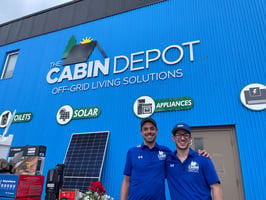Living off the grid with solar power is becoming increasingly popular, especially for those who...
Batteries don’t just die – they are murdered!

Batteries don’t just die – they are murdered!
When our customers buy a solar panel, they hook it up once and usually the only maintenance required is to wipe off the snow occasionally during winter. The same goes for most items we buy nowadays, as we’ve all become accustomed to a ‘maintenance free’ lifestyle. Hook it up, plug it in, and forget about it…But that’s not the case with deep cycle batteries.
There are many deep cycle battery options on the market, such as Sealed VRLA/AGM and the newer Lithium LiFePO4 (The Cabin Depot™ carries them all by the way…) but by far the most cost effective & affordable energy storage option today remains flooded acid. And all batteries require some level of maintenance, flooded acid in particular. Even batteries labeled ‘maintenance free’, are not truly maintenance free, there’s no such thing. The key to ensuring maximum battery life is to perform regular maintenance including the cleaning of terminals & connections, ensuring the connections are tight, topping up the electrolyte if needed (when using flooded acid), and most importantly – proper charging. The most expensive AGM battery will be just as dead as a flooded acid if it’s abused, ignored, and left undercharged.
Occasionally we have our off-grid customers bringing in their batteries, usually in the fall or winter months, for us to check as they “aren’t holding a charge”. This also happens to be when the days are shorter, storms are more frequent, and overall conditions very poor for solar charging. At the same time, we’re not spending as much time outdoors – we’re inside keeping warm so by default our energy use is higher. When we test these batteries, 99% of the time they have been, at some point, left undercharged for an extended period of time which causes sulfation. Without getting into the details of sulfation, let’s just say - it’s bad: Sulfation is like garlic to vampires, or kryptonite to Superman – and sulfation is also the #1 cause of premature battery failure, and is totally preventable by simply keeping your batteries properly maintained & charged! In some cases we can recover the battery so it will hold a charge again, but it will never be the same as it was new and years have been taken from its operating life. Some batteries however, arrive so heavily sulfated they are DOA and not recoverable. So why does this happen? There are a few reasons…
- Underestimating electrical loads. Customers may be using more energy than they realize and the solar system can’t recharge them properly. The batteries remain undercharged for days or weeks at a time, causing irreversible damage.
- Customers don’t check their battery specific gravity on a regular basis. A cheap hydrometer costs $10 and is very easy to use. It takes just a few minutes to check the electrolyte (after a full charge) to identify any possible issues before they become bigger problems.
- Assuming the voltage or State Of Charge (SOC) they see displayed on their controller is representative of the actual battery SOC. While it’s true you can do a rough check of your battery condition using voltage alone, if connected to a controller when the sun is shining, or there are loads connected to the batteries, it is not accurate! What may show 80% or 100% on your controller may in fact be much, much lower. This is why again the use of a hydrometer is recommended as it’s much more accurate.
- Disconnecting the batteries and putting into storage without a maintenance charger connected. Even a fully charged battery will slowly lose its charge over time. The proper procedure when storing a battery over winter is to bring it up to full charge before disconnecting, with a quality maintenance charger used to keep the battery fully charged until ready for use again in the spring.
Now to use an analogy - If you went to the doctor, and the doctor kept telling you that you’re not eating healthy, you should eat less salt, eat more fiber, exercise more – and you don’t, and you end up having a heart attack, should that be a surprise? Probably not. So remember when it comes to battery maintenance, not paying attention to your batteries, performing the required maintenance - and more specifically, not properly charging them - will absolutely result in damage and end their life prematurely. So please, don’t murder your batteries.
- Gord


